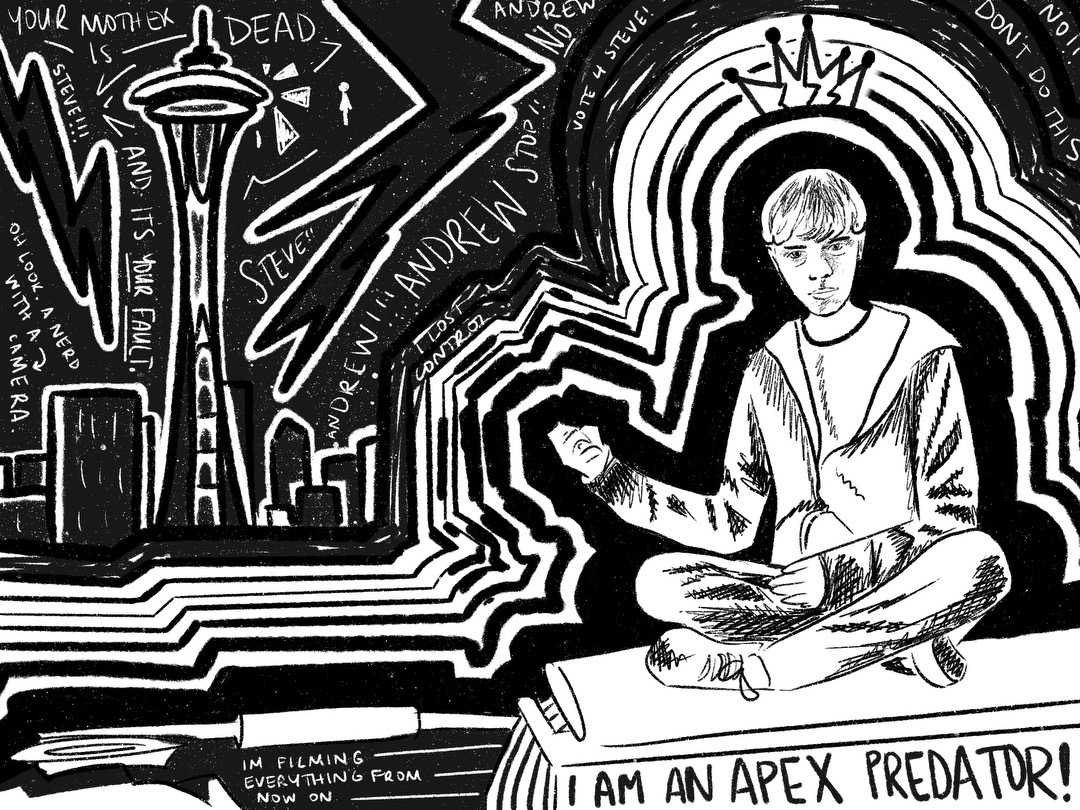Imagine a movie about three mediocre guys who get superpowers, and then everything goes to shit. Chronicle (2012), a found footage sci-fi thriller, does just this. The movie grossed $126 million worldwide, making it a success–considering its budget of $15 million. Chronicle entered the world during the golden age of shaky cam films. With hits like The Blair Witch Project (1999) and Paranormal Activity (2009), the found footage-look was not a novel concept. It was incredibly useful within the horror genre, embodying hand-held camera movements that make the films feel even more real and terrifying.
Chronicle was directed and written by Josh Trank and co-written by Max Landis. Growing up, Trank was exposed to his father’s Holocaust documentary films and found an interest in sinister stories. This dark tone can be seen in his 2015 remake of Fantastic Four as well as Chronicle, which stems from ominous true events. In an interview with Empire Magazine, Trank shares that the concept for Chronicle began as “Columbine with powers.” The Columbine High School Massacre took the lives of 12 students and 1 teacher; the shooters created home videos in which they shared their threatening plans. This closely aligns with the characters of Chronicle, who film their lives as they adapt to their new telekinetic abilities, and the tumultuous environment of high school. Trank and Landis chose to write the script in a way that made the audience sympathize with, and understand, the characters who eventually took it too far.
The POV film follows three teenage boys who stumble across a strange crystal that gives them unusual abilities. Andrew (Dane Dehaan), a socially awkward teen, buys an old camcorder to escape his life of an abusive father, dying mother, and high school bullies. He films everything, sharing his adventures with his cousin, Matt (Alex Russell), and his popular classmate, Steve (Michael B. Jordan). The three slowly realize their true capabilities and the dangerous powers that they wield. But, Andrew leans into the darkness, harming those that have done him wrong and eventually going on a chaotic, murderous rampage through the city of Seattle.
Andrew’s villainous arc contrasts greatly with popular superhero films of the time. The Amazing Spider-Man (2012), starring Andrew Garfield, was a much larger and more successful film. Both films grapple with the message that “with great power comes great responsibility.” However, each story has a different outcome. The early 2000s and 2010s juggled many superhero hits, growing the Marvel and DC franchises in every way, and subsequently overshadowing any other superhero type movie, such as Chronicle. Chronicle competed with large films with built-in fanbases, such as The Avengers (2012), The Dark Knight Rises (2012), The Hunger Games (2012), The Twilight Saga: Breaking Dawn – Part 2 (2012), and numerous others. Today, the superhero formula has become predictable and unoriginal. Its formulaic cash-grabbing hands are a curse we now must stray from.
This fierce competition begs the question of what Chronicle’s success could have been; if it had entered the media today rather than twelve years ago. Chronicle connoisseur, Ethan Kaufman, has viewed the film seven times. He believes, “If Chronicle (2012, notably not 2024) were released today, its critical and box office success may be altered. Much of the charm is that the aggressively handheld cinematography was a product of its time, and superhero stories were still refreshing enough 12 years ago that the tropes hadn’t felt overdone then. The $15 million budget likely would’ve been blown out of proportion in today’s day and age, which would’ve robbed the film of the very thing it does best. Chronicle rides and dies on its low budget and release in the midst of growing superhero film success. I think 2012 was the perfect year for it.” Ethan perfectly captures the essence of Chronicle; its low-budget, hand-held look, and negative character arcs separate it from the other movies of the time. In some ways, it’s tragic that Chronicle was released at a time of glorified comic heroes and dystopian adaptations. Regardless, Chronicle is original; its own apex predator.
The more we try to recreate, the more art will feel lifeless. It is new ideas and concepts that break records and change media. As the formulaic superhero films slowly die, something else shall be born from its ashes. Though, it better not be a Chronicle sequel.
Maddy Dombrow is a sophomore Writing for Film, TV & Emerging Media Major major who genuinely believes she can move objects with her mind. They can be reached at [email protected].

